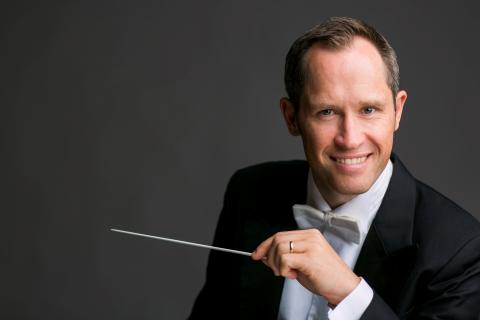Wagner and Respighi fare best in Symphonia’s wide-ranging program

Movie music, childhood memoir, a birthday gift and trio of old masters comprised the bill of fare Sunday afternoon for the opening concert of the season by The Symphonia at Saint Andrew’s School in Boca Raton.
Alastair Willis, music director of Indiana’s South Bend Symphony, was on the podium, providing engaging commentary on the scores and — more often than not — displaying a fine stylistic sense for this program’s diverse offerings.
The program opened with Music for Movies by Aaron Copland, a five- movement suite of excerpts from the iconic American composer’s film scores. Willis drew shapely and well-coordinated playing from the chamber orchestra but it took two movements for the performance to get off the ground. The opening brass fanfare of “New England Countryside” from the 1939 documentary The City is quintessential Copland, and while the ensemble played it well, Willis’s conducting was metronomic and inflexible. Likewise the folksy spirit of “Barley Wagons” from Of Mice and Men (1939) needed more charm and spontaneity.
But Willis captured the signature Hollywood sound of “Sunday Traffic” (also from The City) and brought out the lyricism and refined sensibility of Copland’s evocation of midwestern small town life in “Grovers’ Corners” from Our Town (1940). Of Mice and Men’s “Threshing Machines” fared better than “Barley Wagons,” with Willis eliciting a lithe rhythmic bounce.
Samuel Barber’s Knoxville: Summer of 1915 is a setting of writer James Agee’s childhood memories of his family and the leisurely pace of summer nights in Tennessee. This evocative work is a masterpiece, replete with Barber’s orchestral command and songful vocal lines.
The work also requires a soprano with a rich voice, clear diction and the ability to project a sense of childlike wonder. (Michelle Bradley recently gave a superb performance of the score with the New World Symphony under Carlos Miguel Prieto.)
Willis certainly provided a delicate and strongly characterized orchestral framework: he molded the silky strings and warm-toned winds with spacious eloquence.
But although Robyn Marie Lamp’s soprano voice was firm and resonant, her enunciation of the text was often unclear. Her performance lacked the sense of nostalgia and fantasy that is the essence of the Barber-Agee opus. Lamp was most effective in the sections where the narrative turns to thoughts of death and eternity. Her vocal power conveyed the hymn-infused vision of the afterlife.
Richard Wagner composed his Siegfried Idyll as a birthday gift for his wife and performed the work with a 17-piece ensemble outside her bedroom on Christmas morning, 1870. Wagner’s most gentle and rhapsodic composition, the score still enchants with its vibrant thematic invention and instrumental color. (A German lullaby and themes from the opera Siegfried figure prominently in this musical love offering.) Willis’ astutely paced reading produced finely calibrated ebb and flow, and mellow winds and a clarion horn call contributed to a strong ensemble effort.
Ottorino Respighi’s Trittico botticelliano (Three Botticelli Pictures) is an exquisitely tinted set of sound portraits of the works of a master artist. The opening bars of “Spring” recall the initial lines of the composer’s Pines of Rome but in intimate pastels rather than technicolor. Willis’s vigorous direction and the orchestra’s crisp articulation encompassed the martial joy at the coming of the end of winter. Michael Ellert’s unsteady bassoon solo at the onset of “The Adoration of the Magi” was less than ingratiating, but Willis captured the spiritual dimensions of Respighi’s vignette in broadly phrased strokes.
The prominent piano part by Lisa Leonard was given incisive energy while blending seamlessly into the orchestral fabric. Willis kept the violins’ undertow—depicting the waves—clearly audible throughout the concluding “Birth of Venus.” The flute and harp lines were beautifully detailed and the emergence of the goddess resounded vociferously. The well-balanced program proved an engrossing afternoon musicale.
The Symphonia repeats the Copland, Wagner and Respighi works 7:30 p.m. Tuesday at the Crest Theater in Delray Beach. thesymphonia.org; 866-687-4201.
Posted in Performances
Leave a Comment
Mon Dec 9, 2019
at 2:11 pm
No Comments




